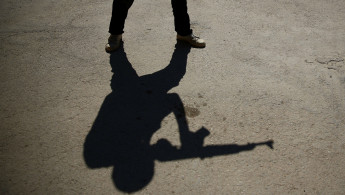Dozens of IS group child soldiers killed in Syria
More than 50 child soldiers recruited by the Islamic State group in Syria have been killed since the beginning of this year, a monitoring group said Wednesday.
The UK-based Syrian Observatory for Human Rights said it had documented the deaths of 52 child soldiers, all under the age of 16, who had reportedly been part of IS' "Cubs of the Caliphate" programme.
The programme provides intense military and religious training to children throughout IS's areas of control in Syria, said the Observatory, an opposition group which uses a vast network of sources inside Syria.
| When a child reaches the point of becoming a suicide bomber, this means that he's been completely brainwashed |
As many as 31 were killed in July alone, in explosions, clashes, and airstrikes by Syria's regime and the US-led coalition.
The child soldiers are used to staff checkpoints or gather intelligence from areas outside IS control, but IS has been increasingly using them to execute prisoners or conduct suicide attacks.
So far this year, IS has used 18 children as suicide bombers, most recently in its fight against Kurdish militia in northeastern Syria.
"This shows that Daesh is exploiting the suffering of the Syrian people," said Observatory head Rami Abdel Rahman, using the Arabic acronym for IS.
"When a child reaches the point of becoming a suicide bomber, this means that he's been completely brainwashed," Abdel Rahman told AFP.
The Observatory said it had received information on dozens more children killed, but that it could not confirm their deaths.
Since the beginning of 2015, IS has recruited more than 1,100 children.
Also on Wednesday, Human Rights Watch criticised the Kurdish People's Protection Units (YPG), which is fighting IS in Syria, of failing to meet a commitment to stop using children in combat.
Human Rights Watch compiled a list of 59 children - 10 of them under 15 - who were recruited by or volunteered for the Kurdish People's Protection Units, YPG and its women's branch, YPJ, since July 2014.
Some children fighting alongside those forces, based on public sources, apparently died in combat in June 2015, the rights group added.
| Armed groups in Syria are placing children in direct harm by giving them weapons and sending them to fight |
"The YPG promised to stop sending children to war and it should carry out its promise," said Fred Abrahams, special adviser at Human Rights Watch.
"Of course the Kurdish forces are fighting groups like ISIS that flout the laws of war, but that's no excuse to tolerate abuses by its own forces."
HRW confirmed seven of these cases by speaking directly with the children’s relatives. In some cases, the groups enlisted children without their parents’ consent.
"My daughter went to school and was taken from there by a group of YPJ," a father of a 14-year-old girl near Qamishli said.
"We knew nothing about her until a YPJ commander called and informed us that she had joined YPJ," he added.
HRW said that YPG in 2014 signed a "Deed of Commitment" with the non-governmental organisation Geneva Call, pledging to demobilise all fighters under 18 within a month.
The Kurdish militia acknowledged that it faced "significant challenges" to stop its use of child soldiers due to the ongoing armed conflict, but added that there had been "some individual cases" over the past year, HRW said.
It noted that on June 13, the YPG demobilised 27 boys - and, a week later, the YPJ demobilised 16 girls.
On July 5, the YPG and YPJ issued a circular to commanders and heads of recruiting centres saying they were not to recruit or accept anyone under 18. Those who fail to comply will face "maximum disciplinary measures", the circular said.
Seven YPG officers had been punished for accepting child soldiers and three were expelled from the force and four demoted, HRW said.
The YPG and YPJ are not the only offenders among the many armed groups in Syria using child soldiers, but they can do more to stop the practice, Human Rights Watch said.
"Armed groups in Syria are placing children in direct harm by giving them weapons and sending them to fight," Abrahams said.
"The YPG has a chance to stop this practice and show that it's serious about keeping its commitments on human rights."
Syria's conflict began in 2011 with anti-government protests, which degenerated into a civil war that has killed more than 230,000 people and forced millions to flee.





 Follow the Middle East's top stories in English at The New Arab on Google News
Follow the Middle East's top stories in English at The New Arab on Google News
![Israeli forces ordered bombed Gaza's Jabalia, ordering residents to leave [Getty]](/sites/default/files/styles/image_330x185/public/2176418030.jpeg?h=a5f2f23a&itok=_YGZaP1z)

